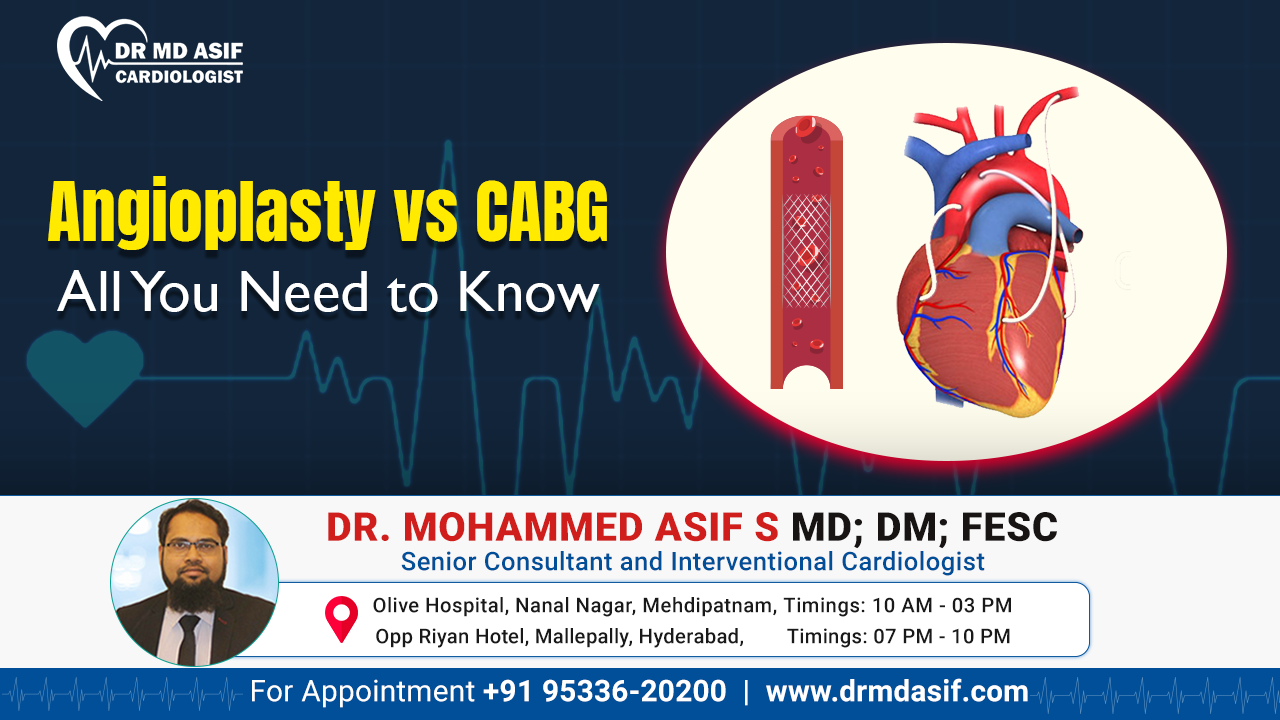Call us for any question
9533620200, 8179002888Meds Super Speciality Hospital
MallepallyTimings: 7 pm to 10 pm
mohammed4248asif@gmail.com

Blog s
Angioplasty vs CABG : All You Need to Know

Updated at: 14 Feb 2024
Facing a heart condition can be overwhelming, especially when you have to face multiple treatment options. The best cardiologist in Hyderabad may suggest going with angioplasty or bypass surgery if you have coronary artery disease. These two major surgical techniques are used to treat clogged or blocked arteries. Both treatment procedures aim to improve blood flow to the heart by unclogging blocked arteries. When deciding whether to undergo coronary artery bypass graft (CABG) or angioplasty, choosing the right treatment line is essential. Read this completely to learn about angioplasty vs CABG, which is important as per patients medical condition.
Angioplasty vs CABG: when do you need it?
Our arteries play a vital role in delivering oxygen-rich blood to our bodies. But when plaque accumulates on their walls, it can block the flow of blood and cause serious medical issues like strokes or heart attacks. Thankfully, there are two effective treatments available: angioplasty and bypass surgery. The right treatment process completely depends on the patients unique medical situation and the number of blocked arteries.
What is Angioplasty?
Angioplasty is a minimally invasive procedure to widen the coronary artery to improve blood flow to the heart. Instead of removing plaque, this process involves expanding the arteries. During angioplasty, a small balloon attached to a catheter guides through the blocked artery. Once it reaches the blockage site, the balloon may be inflated at the plaque or blood clot location, causing the obstruction. In some cases, a stent may also be used.
When is Angioplasty Done?
Angioplasty can be done as an emergency surgery during a heart attack or as a preventive procedure when there is a suspicion of a heart attack. Its purpose is to restore normal blood flow in the coronary arteries. However, not all cases of coronary heart disease can be treated with angioplasty. The cardiologist should decide to proceed with this procedure, taking into consideration the patients specific circumstances.
What is CABG?
Coronary Artery Bypass Graft Surgery (CABG) is commonly known as bypass surgery of the heart. This CABG surgery is performed to improve blood flow to the heart. During CABG surgery, a healthy artery or vein is transplanted into a blocked coronary artery. This creates a new pathway for oxygen-rich blood to bypass the blockage and reach the heart muscles.
When is CABG Done?
Heart Bypass Surgery is also known as CABG. This CABG procedure is required in several situations. It can be performed as an emergency treatment for a heart attack. Additionally, a cardiac surgeon may recommend bypass surgery if:
There is a blockage in the aorta or the hearts left main artery.
The left main artery is narrowed.
There are narrowed heart arteries causing chest pain.
An artery is blocked and cannot be effectively treated with angioplasty.
A previous angioplasty surgery has failed.
Difference Between Angioplasty and Bypass Surgery:
Angioplasty is a minimally invasive procedure that typically requires a small incision on the leg, arm, or wrist. It is suitable for cases where one, two, or three arteries are narrowed. The procedure usually takes about an hour or less, allowing faster recovery. Also, with this angioplasty procedure, the patient has a shorter stay at the hospital than other surgical heart treatments. Patients often do not require anaesthesia and can return to their normal activities within a few days.
On the other hand, CABG (coronary artery bypass grafting) involves larger incisions on the leg and chest. It is a major surgery that may take 3 to 6 hours or longer. Surgeons make larger incisions on the chest (8 to 10 inches long) to access the affected area of the heart. Patients are placed under general anaesthesia during the procedure. Recovery from CABG surgery usually takes around 12 weeks, with post-surgical observation in the ICU for one or two days.
Choosing the Right Heart Treatment for You
When deciding between angioplasty and bypass surgery (CABG), the top cardiologists in Hyderabad consider several factors. Such as:
Overall health condition of the patient.
Severity and extent of coronary artery disease.
Presence of symptoms like chest pain and shortness of breath.
Overall heart function.
Medical history, including high blood pressure, diabetes, or previous heart attack or stroke.
Personal preference of the patient.
In certain cases where multiple areas of the heart arteries are clogged, CABG may be the preferred surgical option. However, elderly patients over 80 years old or individuals with weak health may not be suitable candidates due to the strain involved in this major surgery.
On the other hand, angioplasty may be more suitable when the blockage is not severe, and there are no underlying medical conditions that could worsen post-surgery. It is also considered for patients who have not responded well to medication and lifestyle changes to prevent artery blockage. Additionally, younger patients in good health might choose angioplasty for its less invasive nature and faster recovery time.
Choosing the right heart treatment requires careful consideration of individual circumstances and consultation with a trusted cardiologist in Hyderabad.
Conclusion
The choice between angioplasty and coronary artery bypass grafting (CABG) is not one-size-fits-all. Both procedures have their merits and considerations. Angioplasty offers a less invasive option with quicker recovery times. CABG is more invasive but can provide longer-term benefits, especially for patients with complex blockages. Ultimately, the decision should be made in consultation with a heart specialist in Hyderabad, considering multiple factors. Whichever option is chosen, patients need to commit to lifestyle changes and medication adherence to optimize long-term outcomes. Visit the best cardiology hospital in Hyderabad for all heart-related issues.
Comments

Be the first to Comment
Latest Post
-
⇨10 ways to control high blood pressure without medication
-
⇨Know the Dos and Donts after heart bypass surgery
-
⇨Angioplasty vs CABG : All You Need to Know
-
⇨A Closer Look at Angiography Risks and Benefits
-
⇨What is the difference between angioplasty and angiogram?
-
⇨Connections Between Depression and Heart Disease: What You Need to Know
-
⇨Finding the Best Cardiologist in Hyderabad: Tips and Tricks
-
⇨How to Recognize the Signs of a Heart Attack or Heartburn
-
⇨Why Are Permanent Pacemakers Necessary, and what to expect during surgery?
-
⇨The Impact of Patent Ductus Arteriosus on Quality of Life| Dr Asif
-
⇨What Are the Causes, Risk Factors, and Treatments of Ventricular septal defect?
-
⇨Exploring the Pacemaker Surgery Cost in Hyderabad: What You Need to Know.
-
⇨Discovering the Different Types of ASD: What You Need to Know
-
⇨The TAVR Surgery Cost in Hyderabad: A Comprehensive Guide| Dr. Asif
-
⇨Exploring the Advantages of TAVR: What You Should Know
-
⇨Visualizing Heart Health: An In-Depth Look at Coronary Angiogram
-
⇨Unlocking the Potential of Angioplasty: Types, Procedure Steps, and Promoting Speedy Recovery
-
⇨How Cardiac Resynchronization Therapy Device Work: A Complete Guide
-
⇨AICD Implantation in Hyderabad: A Comprehensive Guide for Heart Patients
-
⇨Pacemaker Surgery and Its Types: A Comprehensive Overview




Leave a reply